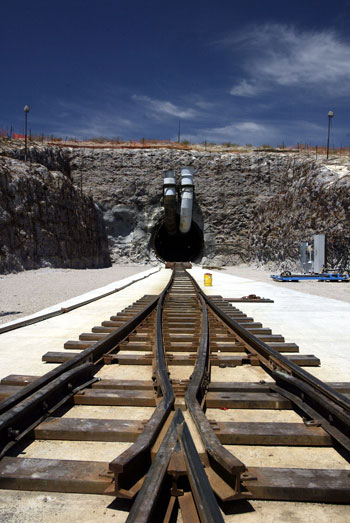Hope Is Not Enough: The Path to Waste Confidence
Cornelius Milmoe /
From Yucca Mountain to reactor design certifications and post-Fukushima reforms, incoming Nuclear Regulatory Commission (NRC) chair Allison Macfarlane has a multitude of issues before her. One of the most critical and least understood is the “waste confidence” mess caused by the Obama Administration’s nuclear waste policies.
A 1979 court decision requires the NRC to provide “reasonable assurances” that offsite nuclear waste storage will be available when reactor licenses expire and that nuclear waste can be stored safely onsite after license expiration if offsite storage is not available.
Since then, the NRC has been able to avoid studying the long-term impact of onsite waste storage by periodically making a “waste confidence determination” (WCD) that provided the two assurances. The offsite storage assurance became easier in 1982, when the Nuclear Waste Policy Act (NWPA) transferred nuclear waste disposal responsibility from waste producers to the federal government. The WCD provides assurance that onsite storage will be safe for 30 years after license expiration.
In 2010, then-chairman Gregory Jaczko pushed the NRC to “update” the WCD to reflect the Administration’s decision to abandon the NWPA-mandated Yucca waste repository. The WCD “update” assumed that Yucca would not be built and expressed doubt about the time needed to bring about the necessary societal and political acceptance for another repository. Still, it determined that a repository would be available “when necessary.”
Four states appealed the update, arguing that the NRC’s “when necessary” determination failed to define the term necessary in any meaningful way. On June 8, the U.S. Court of Appeals rejected the NRC’s update, saying:
The Commission apparently has no long term plan other than hoping for a geologic repository. If the government continues to fail in its quest to establish one, then [nuclear waste] will seemingly be stored on site at nuclear plants on a permanent basis.
The ruling means that hope is not enough to provide reasonable assurances of waste removal, so the NRC must conduct impact studies for new reactor licenses.
Moving forward, the NRC has several options to respond to the court’s remand:
- Appeal. It seems unlikely that any court would rehear the case, since the NRC offered no assurance that the waste would be removed.
- Conduct studies. Anti-nuclear groups have petitioned the NRC to abandon the WCD approach and conduct waste impact studies before approving any licenses. The WCD was intended to express confidence that waste will be removed. Jaczko, the update proponent, seems to have endorsed this approach. But studies could interfere with existing and pending licenses. Studies won’t provide assurances of removal. A repository license would.
- Rely on the NWPA. The NWPA did not exist when the courts required the WCD. Whether good or bad policy, the NWPA is the law, and it mandates federal responsibility for waste disposal at Yucca subject to an NRC license. A WCD that assumes that the Department of Energy (DOE) and NRC will implement the NWPA mandates is a more reasonable assurance of removal to an offsite repository than the remanded update, which assumed that the agencies would defy the NWPA.
- Forget the update. The court vacated the WCD update but not the existing WCD. So the NRC could issue reactor licenses based on the existing WCD without any “update” or studies. In 2009, former NRC chairman Dale Klein warned that it was a mistake for the NRC to update the WCD until the Yucca controversy is resolved. Klein’s recommendation is better than Jaczko’s.
- Restart Yucca. As long as the outcome of the Yucca license remains in doubt, the NRC should not update the WCD based on speculation about what Congress and DOE might do. The court has rejected that approach. Restarting the Yucca licensing proceeding would provide a solid basis for waste confidence; justify continuation of the nuclear waste fee, prevent actions in the courts and Congress that disrupt reactor and repository licensing, and restore trust in the integrity and independence of the NRC.
Cornelius Milmoe is a lawyer and nuclear energy expert who has worked in the government and private sector.

